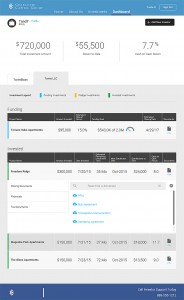
Company of the Month: Investor Management Services leads CRE investment firms into modern era
Boston, MA When Congress saw a chance to jumpstart the post-recession U.S. economy, Robert Finlay envisioned a company that would jumpstart commercial real estate owners’ access to capital and their relationships with investors.
Finlay, a veteran real estate and finance executive, created Investor Management Services following the 2012 Jumpstart Our Business Startups (JOBS) Act. The landmark legislation changed decades-old securities laws to enable businesses and individuals to raise capital in private offerings on the Internet, allowing “general solicitation” without following the same rules that govern public stock offerings. The bill’s passage ushered the term “crowdfunding” into the American vernacular and has led to popular websites such as Kickstarter.com and GoFundMe.com, which have successfully raised millions of dollars from large numbers of new investors for startup ideas and charitable donations.
 Beyond just raising cash, Finlay recognized the JOBS Act held the potential to benefit the commercial real estate industry by empowering real estate sponsors to raise capital, remain connected to their investors in real-time and provide unprecedented levels of transparency and communication. While many crowdfunding firms focused on how the JOBS Act could make capital more accessible, Investor Management Services identified how the confluence of technology and legislation could lead to comprehensive improvements for every side of the real estate deal.
Beyond just raising cash, Finlay recognized the JOBS Act held the potential to benefit the commercial real estate industry by empowering real estate sponsors to raise capital, remain connected to their investors in real-time and provide unprecedented levels of transparency and communication. While many crowdfunding firms focused on how the JOBS Act could make capital more accessible, Investor Management Services identified how the confluence of technology and legislation could lead to comprehensive improvements for every side of the real estate deal.
“General solicitation and the acceptace of technology is one of the most disruptive changes I have ever seen in CRE,” said Finlay, the company’s CEO.
In the mid-1990’s Finlay saw the conduit market change commercial real estate finance and started Commercial Defeasance (Defease with Ease) in 2000 to pioneer the defeasance services market. In 2008, he assembled a portfolio of multifamily properties and eventually recognized the need for a company such as Investor Management Services.
“We realized real estate professionals wanted to use technology to improve the process without giving up the relationships they’ve always had with their investors — and that’s what we’ve built,” he said.
Investor Management Services (IMS), with offices in Boston, New York, Chicago, Los Angeles and Charlotte, hired a team of real estate professionals and software developers to create a full suite of software and services. The IMS team helps its client roster attract millions of dollars in new capital, engage new accredited investors, move paper-intensive relationships with past investors to a modern, professional online investor dashboard, and manage the entire investor relationship with easy-to-use online tools.
Here’s how it works: IMS provides its clients with a secure online investor portal where it can post investment offerings, accept investments and store data and documents for every project, including annual tax documents, distribution statements and subscription agreements. Potential investors create free profiles and can verify their accreditation status, review investment opportunities and place investments. When they invest, deal documents and metrics are automatically displayed on their dashboard.
Real estate sponsors also receive a permissions-based online dashboard to monitor performance and investor activity and manage documents across their portfolio.
“We quickly recovered the two things we missed most: time and resources,” IMS client Rob Libertini of Lloyd Jones Capital said. “The team at IMS was able to take what we have already done and blend it with the latest interactive technology to enhance our investor relationships.”
A 2013 thesis published by the Massachusetts Institute of Technology Center for Real Estate underscores the need for innovation in the commercial real estate capital markets. The study determined post-recession capital for real estate projects has become increasingly concentrated among the largest institutional investors. This trend has choked capital flowing to smaller deal sponsors. Meanwhile, fewer small institutions and individual investors are providing capital for real estate projects because large institutional REITs often push other capital sources out of the market by requiring significant investment minimums.
 Investor Management Services leverages the expertise of a team of about 100 real estate and technology professionals.
Investor Management Services leverages the expertise of a team of about 100 real estate and technology professionals.By moving sponsors and investors to a direct online investment model, the playing field is leveled, Finlay said. Sponsors can attract investment directly from accredited individuals and institutions looking for better returns from a strong relationship with a proven sponsor leveraging local expertise.
“I fundamentally believe the JOBS Act, combined with the Internet and 21st century technology, has introduced some of the most transformative forces the commercial real estate industry has ever seen,” Finlay said. “How we raise money, communicate with our investor base and manage projects has changed forever. Our clients recognize these trends and are taking steps to move their businesses into this new era.”
Finlay grew up in his father’s commercial real estate business in New Hampshire, graduated from Southern New Hampshire University and pursued a successful career on Wall Street before striking out as a successful commercial real estate entrepreneur.
IMS is part of the QuietStream Financial portfolio of commercial real estate companies. Other companies in the portfolio that were started by Finlay include Radian Generation, Fairview Real Estate Solutions, Asset Reviewers, Commercial Defeasance and Boston-based Tax Credit Asset Management.
